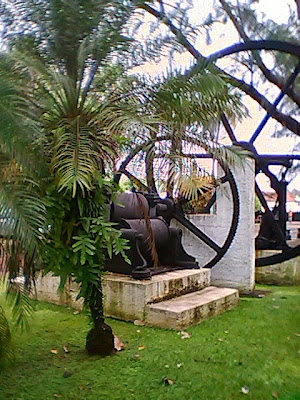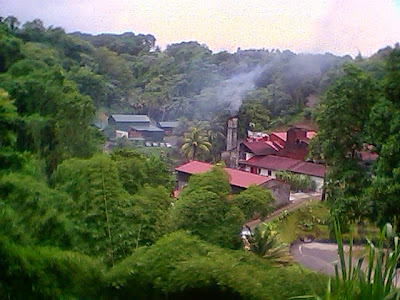While in Martinique I had the opportunity to visit three of the eleven distilleries they have on the island.
The distillery was founded 1763 by a priest by the name of father Lefebure who in 1765 changed the name to St. James for a more English sounding name when Louis X1V banned all exports to the French mainland. Martinique was allowed to export to New England which later became part of the USA and other Caribbean islands. The British had ownership of Martinique on several occasions the longest during 1794 to 1850 and was handed over to France after Napoleon surrendered.
Sugar cane was crushed and the juice extracted, it was then placed in large containers to ferment to a "wine".
After fermentation the 'wine" was distilled by copper distillers and then placed in wooden oak barrels to age.
The rum products are plentiful and packaged beautifully. Most of the distilleries tours are free including the museum at St. James Distillery. They had their traditional punch coco, a concoction of coconut milk, white rum and condensed milk with nutmeg and spices. There was the peanut version, the passion fruit versionand the mango version. The liqueurs were tantalizing using every fruit and spice flavour that is found on the island. Sampling made me giddy and a bit tipsy. They had cane syrup as well nicely bottled for sale. The majority rum distilleries grow most of their own sugar cane for their production on surrounding acreage.
A wooden mill that was turned by oxen or men used for crushing the sugar cane. It was most likely introduced by the Dutch Jews from Brazil and was the first piece of equipment used in the early days of sugar cane production .

Copper distillers used over the years improving the production process.
Many of these distillers were used up to the late 18th century when more modern equipment was introduced

The museum at St. James was awesome, the history of rum making in Martinique along with some of the other methods used in other islands like Jamaica was also mentioned. The method of rum making is fascinating, the sugar cane juice is fermented to a "wine" then distilled to become rum and then stored in oak or walnut casks or barrels to age depending on the desired colour. The antiquated copper vats and distillers were on show including many pieces of old machinery and railway cars that were used in earlier times and now used for tours around the plantation.
The equipment has changed however the methods remain the same.
Situated on the foothills of Mt. Pelée the surrounding greenery was soothing to the eye. The atmosphere oozed an air of extreme tranquillity
Rum ageing in wooden barrels.

Stainless steel has replaced many of these copper distillers for a more economical production. This distiller uses both for their rum production. Large distillers bought out many small distilleries along with their equipment to continue their traditional methods for producing different types of rum.
Many distilleries had finished production for the year and were going through their routine after production maintenance.
I couldn't leave Martinique without purchasing my Punch Coco and Pina colada. The retail shop at Depaz was one of the finest I have seen. The product range left me wide-eyed and open-mouthed.
JM distillery nestled in a valley in Macouba in the North East at the foot of Mt. Pelée was the most picturesque of the three.
The distillery was closed and I was more interested in the exterior than the inside. I was fascinated with the river and the nearby banana shed that was preparing them for export to France.

Bananas on their way to be cut and washed

more to come ........































What a lovely tour of these distilleries.
ReplyDeleteMaybe it's time for me to revisit Martinique after all.
I don't know who you are trying to fool with those 3 bottles of rum products that you posted, but I feel customs jack you up for a suitcase full of rum products...hahahha
I thought Martinique sounded lovely from your previous post, but after reading this it seems even better. You have portrayed the tranquility of the island and I like the sounds of the rum drinks!!
ReplyDelete